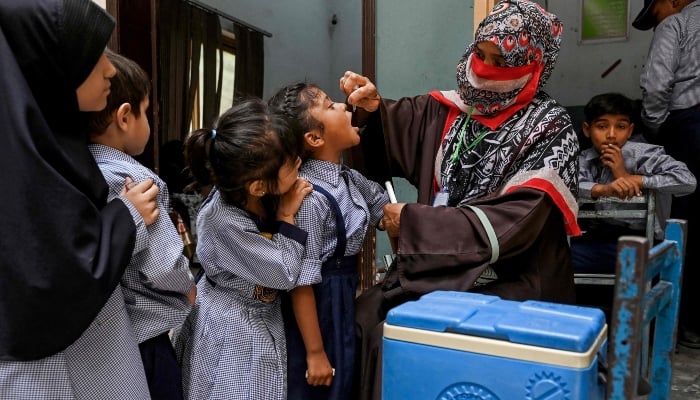Poliovirus detected in environmental samples from seven districts across Pakistan
Virus confirmed in environmental samples from Gwadar, Quetta, South Waziristan, Rawalpindi, Larkana, Mirpurkhas
June 21, 2025

- Poliovirus not detected in samples from Pishin, Lahore.
- Total nine sewage samples collected from nine districts.
- Samples were collected between May 8 and 23.
KARACHI: The Pakistan Polio Eradication Programme has confirmed the presence of poliovirus in environmental samples collected from seven districts across Pakistan.
The presence of the virus was confirmed in environmental samples from Gwadar, Quetta, South Waziristan (lower) and South Waziristan (upper). Additionally, poliovirus was also detected in environmental samples collected from Rawalpindi, Larkana and Mirpurkhas.
In a positive news, environmental samples collected from Pishin and Lahore were declared free of the poliovirus by the Polio Eradication Programme, the public organisation fighting to end the crippling disease from the country.
According to the anti-poliovirus organisation, a total of nine sewage samples were collected from nine districts across Pakistan between May 8 and 23 as part of environmental surveillance efforts.
The Emergency Operations Centre (EOC) on June 16 reported that vaccination refusal rate was on the rise in Karachi, with at least 37,711 parents turning down polio vaccine in May.
This marked an increase in refusal cases as parents in the port city continued to decline vaccinating their children against polio.
In April, 37,360 parents refused the anti-polio vaccination, according to the EOC.
The centre stated: "The refusal rate during the anti-polio campaign remains a constant challenge. Polio eradication requires ongoing support from parents."
Special attention is being given to union councils that are at risk for polio. Misunderstandings and a lack of awareness are identified as the main reasons for vaccine refusal.
Polio is a highly infectious disease caused by the poliovirus, primarily affecting children under the age of five. It can invade the nervous system, leading to paralysis or even death. Although there is no cure for polio, vaccination is the most effective way to protect children from this disease.
Pakistan is one of the two polio-endemic countries in the world, along with Afghanistan, and the number of cases every year had significantly dropped in the country, until the recent spike in cases.
So far this year, Pakistan has reported 6 cases from Khyber Pakhtunkhwa, 4 from Sindh, and 1 each from Punjab and Gilgit-Baltistan, after Pakistan reported its 12th poliovirus case of this year from KP’s Bannu district on Friday.
Despite progress in national campaigns, southern KP remains a challenge due to access issues and barriers to house-to-house vaccination, leaving many children unvaccinated and vulnerable.
In 2025, three national campaigns — held in February, April and May — have reached over 45 million children, supported by 400,000 frontline workers, including 225,000 female vaccinators, the Regional Reference Laboratory for Polio Eradication at the National Institutes of Health (NIH) Islamabad noted.
Last month, the Pakistan Polio Eradication Programme officially launched its third National Immunisation Days (NIDs) campaign in an effort to make Pakistan a polio-free nation.











